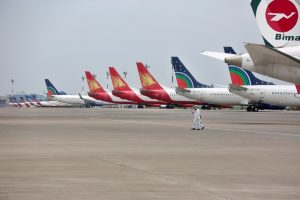Dhaka, Oct 28 – Commuters faced immense sufferings as transport workers across the country went on a 48-hour work abstention on Sunday to press home their eight point-demand, including amendments to the recently passed Road Transport Act. Bangladesh Road Transport Workers Federation on Saturday announced the work abstention programme from 6 am on Sunday to 6 am on Tuesday.
In the capital, no public transport, except some CNG-run auto-rickshaws and rickshaws, were seen plying roads with a large number of commuters waiting on roads for transport to reach their destinations.
Public transports, including buses, minibuses and human haulers stayed off the roads since morning in response to the strike, leaving the city dwellers, including office-goers and students, in disarray.
No inter-district buses left Gabtoli, Mohakhali or Sayedabad terminals in the morning.
CNG-run auto-rickshaw drivers and rickshaw-pullers were demanding excessive fares taking advantage of the situation, alleged commuters.
Many people were seen moving on foot or travelling by rickshaw to reach their destinations –sometimes paying double or triple the fare of the usual one.
The government-run Bangladesh Road Transport Commission (BRTC) bus service was the only public transport option available throughout the city.
Traffic inspector Asad at Abdullahpur in the capital said there is no public transport on the roads since morning. The number of private vehicles is also limited. People are travelling on rickshaws to reach their destinations.
Basu Deb, who works at a private company and resides in Mirpur’s Purobi area, said he had to wait on the road for a public bus from 6 am to go Motijheel, but no vehicle was there.
“Later, I had to hire a rickshaw,” he added.
No long-route buses left their respective bus stands following the strike. Loading and unloading of goods at Benapole port remained suspended on Sunday following the countrywide transport strike.
No goods-laden truck from Bangladesh entered the Indian side following the strike.
The demands of the transport workers include making all the offences by road accident ‘bailable’, cancellation of the provision of fining Tk 5 lakh for involvement in a road accident, keeping a representative from their federation in any probe body formed for road accident, fixing minimum educational qualification for getting a driving licence to class-V, and stopping police harassment on roads.
Earlier on October 12, the workers’ association decided to stage demonstrations by going on a two-day work abstention from October 28 to press home their eight-point demand that included amendments to the Road Transport Act, if their demands are not met by October 27. -UNB




